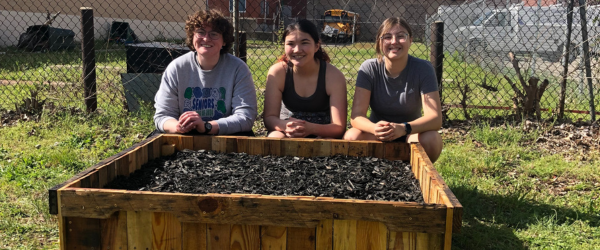Written by Molly Bardine, English Teacher and Department Chair, Senior Capstone Coordinator [email protected]
Ten years ago, the director of our Campus Ministry, Kelli Kinnear, approached me about revising the senior service project. Previously, seniors chose a social justice issue and as an entire class organized a service project which often centered around a fundraiser and then an educational awareness campaign. The goal of revising the current project was to challenge our seniors to take on a more independent but still collaborative role in making an impact on an issue, and specifically move from service to justice with a focus on leadership.
Cross-Curricular and Inquiry Based
The Chaminade Julienne Capstone Project is a cross-curricular, inquiry-based research project which aims to move students from required service hours to a justice project where they are the leaders of social change and civic action. Students evaluate issues through the lens of Catholic Social Teaching themes of Life and Dignity of the Human Person, Call to Family, Community and Participation, Rights and Responsibilities, Option for the Poor and Vulnerable, the Dignity of Work and the Rights of Workers, Solidarity and Care for God’s Creation. Various projects undertake such social issues as poverty, body image, food deserts, human trafficking, mental health, education, environmentalism, fair trade, immigration and refugees and many more. The project often builds upon the Integrated Social Justice Research Paper written during their junior year. Students research an issue related to a service placement.
Seniors work in teams of two, three or four for an entire school year to complete the four phases of the project. Phase one is completed at the start of the school year. Students write a 200-250-word proposal identifying their issue, compose three research questions for their inquiry and explore possible project ideas. Then during phase two students complete a six to ten source annotated bibliography which will inform their project. The project must be grounded in research. Phase three is the implementation of the project. Students may create something, take a specific action or both. Finally, in phase four students present their findings in a public forum and individually write a reflection about the entire project. Our public forum is the Sister Dorothy Stang Symposium which honors the life and legacy of Sister Dorothy Stang, SNDdeN ‘49, who was martyred in 2005 for her work regarding human dignity, justice for the poor and sustaining the balance of the rainforest.
Faith in Action
In their final reflections students will often recognize how they have found the project to be a concrete way to put their Catholic faith into action. They are able to recognize that they have within themselves the power to make an impact on an issue and the lives of others. As one senior wrote this past year, “Through reading about Catholic Social Teachings, I grew in my faith as I learned that I should always be working towards helping those in need as it is what God calls me to do. I have always valued justice and believed that everyone deserves to be treated fairly and with respect…I realized that this is something that I could be (and should be) doing for the rest of my life. Service and helping others gives my life purpose and this capstone process has helped me learn that I am truly a service-oriented person who values compassion and integrity.”
The Capstone experience has energized our entire school and local community as we witness our seniors really come to understand the call of servant leadership in the Church and we are very inspired by their various projects.
Chaminade Julienne Catholic High School, Archdiocese of Cincinnati, Cincinnati, OH, was the recipient of the Dr. Karen M. Ristau Innovations Award, part of the annual NCEA President’s Awards.

